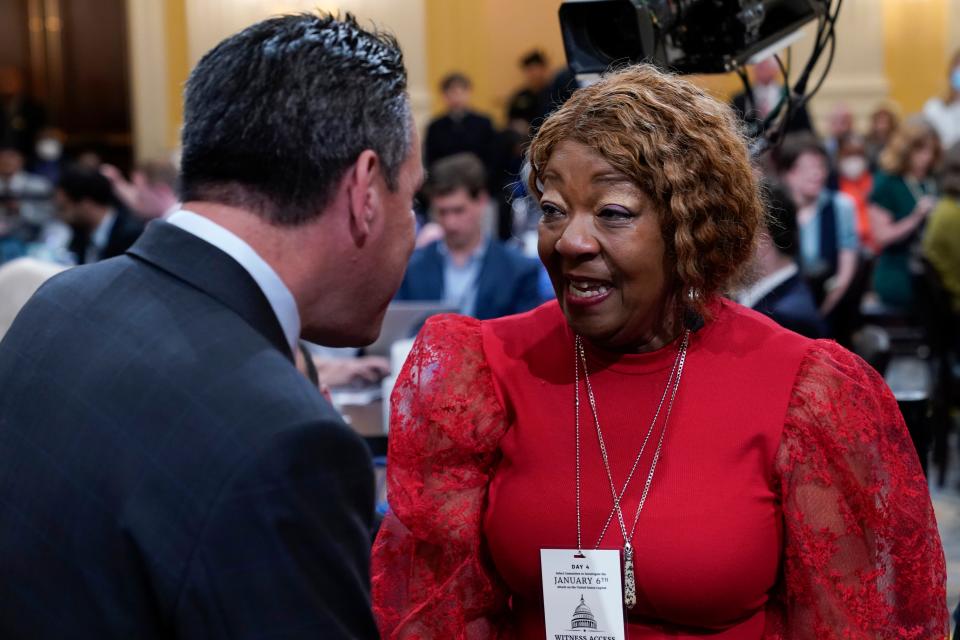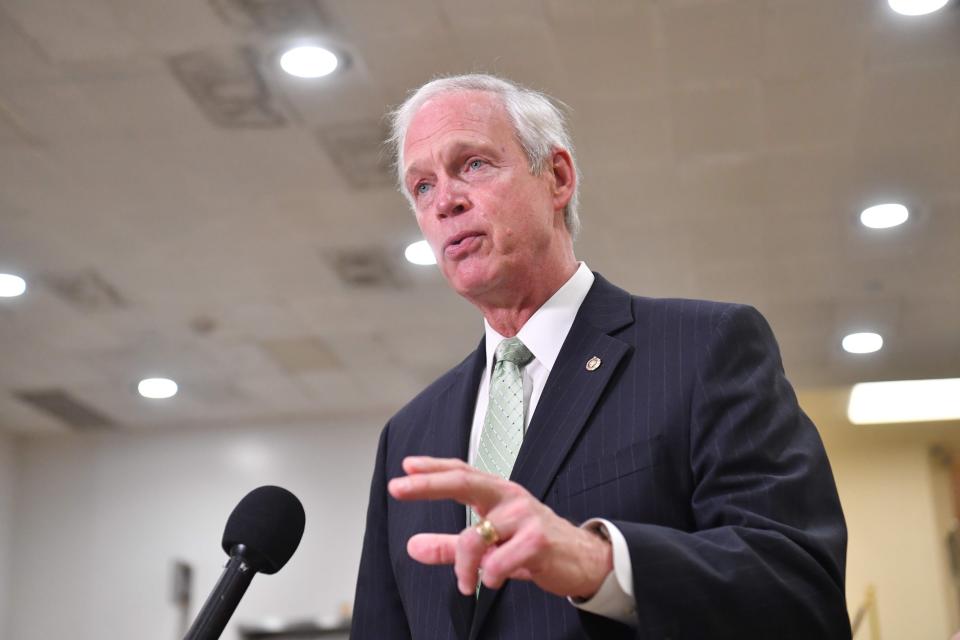Jan. 6 hearing takeaways: Trump's false claims led to threats that turned lives 'upside down'
- Oops!Something went wrong.Please try again later.
- Oops!Something went wrong.Please try again later.
- Oops!Something went wrong.Please try again later.
WASHINGTON – State election officials on Tuesday described for the House committee investigating the Jan. 6 attack on the Capitol how a flood of emails and texts – followed by death threats – targeted them after President Donald Trump pressured them to overturn the 2020 election.
Arizona House Speaker Rusty Bowers testified about weekly protests outside his home, including one where there was an armed man. Georgia Secretary of State Brad Raffensperger described sexualized messages left for his wife and a break-in at his daughter-in-law's home.
Shaye Moss, a registration official in Fulton County, Georgia, recalled death threats after Trump's allies circulated misleading video about where votes were counted.
The anecdotes were among the emotional highlights of a hearing where the committee documented Trump's pressure on the officials – and the fallout from threats and protests. The hearing followed sessions in which Trump aides testified that they repeatedly told him he lost the presidential election, though he pressured Vice President Mike Pence to reject electors for Joe Biden.
Jan. 6 committee hearing schedule: Here's what to expect at Jan. 6 hearings
"When he used the power of his presidency to put the enormous pressure on state and local election officials, and his own vice president, it became downright dangerous," said Rep. Adam Schiff, D-Calif., who led the questioning. "If the most powerful person in the world can bring the full weight of the presidency down on an ordinary citizen who is merely doing her job with a lie as big and heavy as a mountain, who among us is safe?"
Here are the takeaways from Tuesday's hearing:
Georgia election worker describes death threats
In the most emotional testimony, Moss described social media attacks and death threats after Trump’s allies circulated a video falsely accusing her of election fraud. In one clip showing her sharing a ginger mint, she was wrongly accused of exchanging a USB drive.
“There were just a lot of horrible things there,” Moss said. “Lot of threats, wishing death upon me, telling me I’ll be in jail with my mother.”
Moss said her life was turned “upside down."
Moss, who left the Fulton County job in April after more than a decade, told the committee she no longer gives out her business card and doesn’t want “anyone knowing my name.” She doesn’t go out anymore with her mom “because she might yell my name over the grocery aisle or something. I don't go to the grocery store at all.”
“I haven’t been anywhere at all. I gained about 60 pounds. I don’t do nothing anymore, I don’t want to go anywhere. I second-guess everything that I do,” Moss said. “It’s affected my life in a major way. Every way. All because of lies.”

A mother's fear and loss
The committee detailed how Trump falsely accused Moss’ mother, Ruby Freeman, of being an “election scammer” 18 times during a phone call with state officials.
The FBI warned Freeman she wasn’t safe in her home, so she stayed away for two months.
“It was horrible. I felt homeless,” Freeman said. “I can’t believe this person has caused this much damage to me and my family to have to leave my home that I’ve lived there for 21 years.”
Freeman, a small-business owner, said she no longer feels safe after being targeted by Trump and his allies.
“There is nowhere I feel safe. Nowhere,” Freeman said. “The president of the United States is supposed to represent every American, not to target one.”
State officials withstand Trump pressure
Republican officials from Arizona, Michigan and Pennsylvania described the pressure Trump applied to flip the results from states supporting Biden. Trump tweeted Nov. 21, 2020: “Hopefully the Courts and/or Legislatures will have the courage to do what has to be done to maintain the integrity of our elections.”
After Trump advertisements urged supporters to contact lawmakers, Bowers said he received more than 20,000 emails and tens of thousands of voicemails and texts. The deluge of emails and calls made it challenging for his office to work and communicate, Bowers said.
Trump disclosed Michigan Senate Majority Leader Mike Shirkey’s personal phone number, which sparked 4,000 text messages, Shirkey said in a videotaped deposition.
“It was a loud noise, a loud consistent cadence of, ‘We hear the Trump folks are calling and asking for changes in the electors and you guys can do this,’” Shirkey said. “They were believing things that were untrue.”
More: Is the Jan. 6 committee sitting on explosive evidence of Trump's role in the Capitol assault?
Pennsylvania House Speaker Bryan Cutler received daily voicemails from Trump lawyers Rudy Giuliani and Jenna Ellis during the last week of November. Cutler’s personal email, cellphone and home phone number were shared online.
“We had to disconnect our home phone for about three days because it would ring all hours of the night and fill up with messages,” Cutler said.
State officials contradict Trump on election fraud
Several state officials contradicted Trump’s claims of election fraud in his attempts to overturn the 2020 election.
Trump issued a statement minutes before Bowers’ testimony Tuesday, saying the two talked by phone in November 2020 and Bowers called the election “rigged.” Bowers, who campaigned with Trump, confirmed having a conversation with Trump but called his statement untrue.
“Anywhere, anyone, any time has said that I said the election was rigged – that would not be true,” Bowers said.
Bowers denied Trump’s claim that he won Arizona. “That is also false,” Bowers said.
Raffensperger testified about a phone conversation in which Trump urged him to “find” 11,780 votes to overturn his election loss. Raffensperger said votes were counted accurately.
“There was no shredding of ballots,” Raffensperger said.
Gabriel Sterling, chief operating officer for the Georgia secretary of state, said it was frustrating to answer Trump’s repeated lies in speeches and social media posts.
It was like “a shovel trying to empty the ocean,” Sterling said.

Trump's own campaign workers disagreed with him
As Trump’s legal challenges to the election repeatedly failed, campaign lawyers no longer wanted to pursue alternate slates of electors, according to videotaped testimony.
Justin Clark, one of the lawyers, said he told others that convening electors in states Trump lost was not appropriate unless litigation was pending.
“I’m out,” Clark said.
Cassidy Hutchinson – who was a top aide to Trump’s chief of staff, Mark Meadows – said she participated in a meeting during which the White House counsel’s office said the law did not support the plan for alternate electors.
Robert Sinners, a former campaign staffer, said he and others felt anger over the scheme for fake electors that the lawyers wouldn't even support.
"We were useful idiots – just rubes at this point," Sinners said.
Trump's pressure takes emotional toll on state officials
Raffensperger testified that his family faced threats from Trump’s more radical followers. After he and his wife Tricia’s email and phone numbers were published, she received messages that “came in as sexualized texts, which were disgusting,” Raffensperger said.
Trump’s followers broke into his daughter-in-law’s home, he said. “My son has passed, and she’s a widow and has two kids,” Raffensperger said. “And so we’re very concerned about her safety also.”
Michigan Secretary of State Jocelyn Benson recalled the chants of protesters outside her house, calling her a “tyrant” and a “felon.”
“The uncertainty of that was the fear. Are they coming with guns? Are they going to attack my house?” Benson told the committee in a videotaped deposition. “I’m in here with my kid, you know, I’m trying to put them to bed. And so that was the scariest moment, just not knowing what was going to happen.”
Bowers testified protesters outside his home played videos and blared claims over loudspeakers that he was corrupt and a pedophile. At one protest, he noticed a man with a gun arguing with one of his neighbors.
“When I saw the gun, I knew I had to get close,” Bowers said.
Bowers said the protests upset his daughter, who was gravely ill, and his wife. “It was disturbing,” Bowers said.

Witnesses: Lawmakers helped Trump
The committee documented how Republican members of Congress tried to help Trump.
Text messages from a staffer for Sen. Ron Johnson, R-Wis., said the senator wanted to hand-deliver fake electors from Michigan and Wisconsin to Pence minutes before a joint session of Congress began counting the electoral votes Jan. 6, 2021.
A Pence aide, Chris Hodgson, instructed Johnson’s aide not to give Pence the alternate slate.
A Johnson spokeswoman, Alexa Henning, tweeted Tuesday that Johnson was unaware of the exchange between staffers for his and Pence's office.
Rep. Andy Biggs, R-Ariz., called Bowers on Nov. 30 – the day Arizona was scheduled to award electoral votes to Biden – to ask Bowers to decertify the official electors. Biggs defied a committee subpoena to testify.
“I said I would not,” Bowers testified Tuesday.
Echoes of Watergate
Schiff, a former federal prosecutor who led the first impeachment against the former president, called Trump’s lies about 2020 election fraud a “dangerous cancer on the body politic,” which echoed a phrase from the Watergate scandal 50 years earlier.
White House counsel John Dean warned President Richard Nixon during an Oval Office meeting March 21, 1973, about the consequences from a scandal following a break-in at the Democratic National Committee’s headquarters and subsequent cover-up.
“We have a cancer within – close to the presidency, that’s growing,” Dean said.
Schiff’s description of Trump’s baseless claims of election fraud echoed that sentiment.
“The president's lie was and is a dangerous cancer on the body politic,” Schiff said. “If you can convince Americans that they cannot trust their own elections, that anytime they lose, it is somehow illegitimate, then what is left but violence to determine who should govern?”
This article originally appeared on USA TODAY: Jan. 6 hearing takeaways: Threats, Trump camp slammed elector plan

